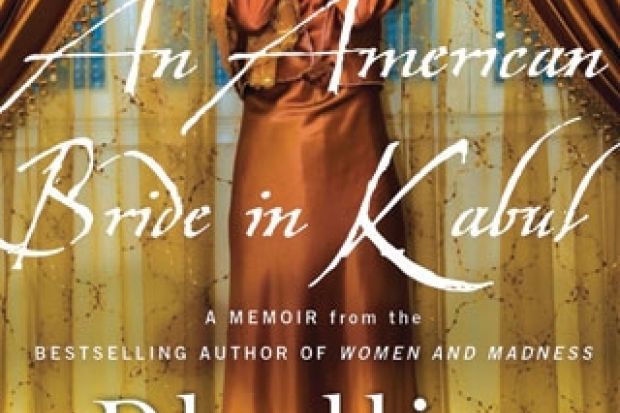More than once in the course of this dramatic memoir by American feminist and psychotherapist Phyllis Chesler, the author breezily confesses to a fondness for wearing kaftans. One imagines her wearing such a thing while writing this very book, and certainly long after the failed (and, it would be fair to say, disastrous) marriage to an Afghan man in 1961 that forms its main subject. “Call me an Orientalist,” she dares us, and indeed you might when she concedes an unabashed affection for “perfumed gardens, indoor courtyards, open cooking fires, brightly glazed hookahs, highly ceremonial communal meals with large extended family, the smells and sounds of the bazaar, snow-capped mountains, and a thrilling expanse of sky”.
Oddly, this line of plainly romanticising “Orientalism” runs throughout the memoir, despite what turns out to be Chesler’s profoundly unhappy experience of married life in Kabul. Given the authenticity of her first-hand encounter, one might be persuaded to take these clichés as truths, and it is perhaps to her credit that Chesler emerges from the whole sorry affair with a sensibility still susceptible to Afghan colour and culture. But her account of Arab brutality and backwardness might read as a stream of typical “Orientalisms” too, and here it is especially hard to dispute the uncomfortable facts of her experience. Indeed, since it is experience that forms the basis of Chesler’s excoriating critique of the sexual inequality, misogyny and violence that she perceives as endemic to Afghan society, the book as a whole is a rather gruelling and discomforting read that sits uneasily with any decent reader reasonably agile in the cultural relativising by which one sometimes attempts to square such troubles. Yet a forgivingly relativist reader (I raise a floppy hand here) would likely fall into the line of Chesler’s fiery critique when in the second half of the book she champions the severest of Muslim or ex-Muslim “dissidents”, including Ayaan Hirsi Ali and Ibn Warraq.
This book is certainly extraordinary; it is intriguing, unique and not necessarily good, all at the same time. It is a breathless, excitingly told, outsider’s inside account of the domestic life of Afghans, and yet it is as often weirdly sentimental as it is censorious. The young Chesler, as she is recalled, is an admirably brave and undaunted heroine, and from the heady adventure of her youth springs the analysis of an older, more cautionary Chesler. As a result, the author emerges confusingly: world-weary and yet puzzlingly naive, seduced by and yet unforgiving of Arab life, cosmopolitan and yet culturally intolerant. At times, the book reads as though it were written in the voice of a bold and unyielding North American feminist, intercut with scenes from a Harlequin novel. The inside blurb of this book sensationally promises a “riveting” tale of “one woman’s harrowing ordeal in a harem in Afghanistan”. This smacks of a publisher’s cheap sensationalism and detracts slightly from what is, often enough, genuine insight. Chesler details how social status inflects gender experience: her account of impoverished Afghan women shopping for groceries describes a disturbingly daily sexual assault course. No wonder then that she concludes: “The Afghanistan I came to know was and still is a place where misogyny and violence are indigenous, pandemic, and considered normal.” For the burka Chesler reserves particular contempt, and, robustly damning it as a “sensory deprivation isolation chamber” tantamount to “torture”, she advocates its prohibition. It is a hard line and one that has no truck with the notion that its enforced non-wearing in Western democracies might be as problematic as its coerced wearing in Islamic states.
This is not a bad book – there’s an illuminating history of Western travellers in the Middle East and an interesting attempt at unearthing the secret history of Jews in Afghanistan – but beyond its biographical concerns, it is an analysis that lacks genuine intellectual contour, care and consideration. The sudden leap to the post-9/11 US prompts a rather stark analysis: “Some blamed America and felt the jihadists were justified in mass murdering civilians. Others, like myself, strongly disagreed.” A “heartless friend” is unceremoniously rejected for identifying with the former, rather than the latter. There’s something oddly anti-intellectual in Chesler’s inability to acknowledge light and shade here and throughout the book. And this is a shame, since there’s a passionate and reactive feminism behind it all that one might otherwise have found admirable.
An American Bride in Kabul: A Memoir
By Phyllis Chesler
Palgrave Macmillan, 256pp, £16.99
ISBN 9780230342217
Published 1 October 2013
Register to continue
Why register?
- Registration is free and only takes a moment
- Once registered, you can read 3 articles a month
- Sign up for our newsletter
Subscribe
Or subscribe for unlimited access to:
- Unlimited access to news, views, insights & reviews
- Digital editions
- Digital access to THE’s university and college rankings analysis
Already registered or a current subscriber? Login





